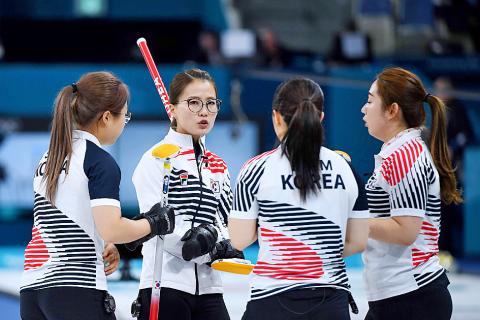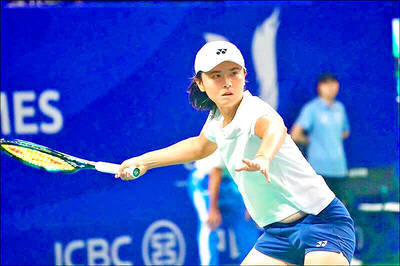Members of the South Korean women’s curling team were the unexpected heroines of last year’s Winter Olympics, but since their impressive run to the final they have endured a nightmare year.
Known as the “Garlic Girls” for their rural hometown where the pungent bulb is a speciality, all five have the surname Kim and use food-based nicknames to differentiate themselves.
Rank outsiders at the start of the Pyeongchang Games, they upset top teams Canada and Switzerland and shot to fame, with the wide glasses and trademark stare of skipper Kim Eun-jung — known as “Annie,” after a yogurt brand — inspiring viral memes online.

Photo: AFP
In the end, Annie, with “Pancake” Kim Yeong-mi, her sister “Steak” Kim Kyeong-ae, “Chocho” Kim Cho-hi and “Sunny” Kim Seon-yeong, named after sunny-side up eggs, fell at the final hurdle and had to be content with silver — and national stardom.
However, months later, they went public with allegations of abuse and exploitation by their coaches, part of a wide-ranging scandal that has engulfed South Korea’s sports establishment.
Sidelined from the national team and unable to take part in international competitions, the Garlic Girls have plummeted from seventh to 111th in the world rankings.
South Korea is a regional sporting power, regularly in the top-10 medal tables at the summer and winter Olympics.
However, in an already intensely competitive society, winning is virtually everything in its elite sports community, where coaches hold immense power over athletes’ careers.
Physical and verbal abuse are reportedly rife — even in sports as little-known and poorly-funded as curling.
The team said that their coaches verbally abused them countless times; had banned them from talking to other athletes; did not share how donation and prize money was being spent; and censored their social media accounts and letters from fans.
The curlers were “miserable” and in a “desperate situation,” they wrote in a letter to the Korean Sport & Olympic Committee, saying that their human rights were “being violated.”
“We’ve reached a point where it has become unbearable,” they said.
In December last year, the coaches resigned.
Before Pyeongchang, curling was largely unknown in South Korea, which did not even have a team until the 2014 Sochi Olympics.
The Garlic Girls narrative centered around the unlikely success of obscure athletes with limited resources, but their revelations showed the extent of abuse in South Korean sports, said Choi Dong-ho, director of the Center for Sports Culture research group.
Their accusations came amid a series of allegations of sexual and other abuses by coaches in disciplines ranging from skating to judo and taekwondo, including from double Olympic short track gold medalist Shim Suk-hee.
While many South Koreans found the curlers’ revelations shocking, verbal abuse, corruption and intrusive control were “nothing new” in the country’s sports world, Choi told reporters.
“Abuse tends to be more prevalent in communities of little-known sports, as they are more close-knit and even isolated from the outside world,” he said.
“I think people were shocked, not necessarily because of what the curlers revealed, but because they were such unexpected stars at the Pyeongchang Games — so many [South] Koreans were touched and felt proud because of them,” he added.
In the face of the growing #MeToo movement, the South Korean government last month announced an investigation into sexual and other abuses in sport, and increased penalties for perpetrators.
“We need to walk away from the winning-at-all-costs philosophy,” South Korean Minister of Culture, Sports and Tourism Do Jong-hwan said.
However, Yeo Jun-hyung, a former skating coach who now leads a group of activists against abuse in sports, cautioned that the issue might rapidly fade from public and media consciousness.
“That’s the thing about sports [in South Korea], people forget about them when athletes are not on TV,” he said.
Choi pointed out that the campaign against abuse was initiated by the athletes themselves — including the curlers — rather than authorities.
“Most [South] Korean athletes in the past, many of whom work as coaches or sports officials today, shared this thinking that if you want to succeed in the sports field, you just have to endure everything — even if it means being beaten and cursed all the time,” he said.
“But the new generation is saying that they are not going to put up with it anymore,” he added.

Luka Doncic on Monday produced a 46-point masterpiece as the Los Angeles Lakers snapped the Chicago Bulls’ four-game winning streak with a 129-118 victory on the road. Doncic rattled in eight three-pointers on 15-of-25 shooting from the field, finishing with seven rebounds and 11 assists to lead an impressive Lakers effort at the United Center. LeBron James chipped in with 24 points, five rebounds and three assists, while Rui Hachimura delivered an eye-catching cameo off the bench with 23 points from nine-of-11 shooting. The win was another encouraging result for the Lakers after a 116-110 defeat of the Dallas Mavericks on Saturday. “We did

The Milwaukee Bucks’ Giannis Antetokounmpo on Friday said that he will probably be out for an extended period after hurting his right calf again after a similar injury caused him to miss eight games earlier this season. Antetokounmpo had his right calf wrapped in the first half of their 102-100 loss to the Denver Nuggets. He did not appear comfortable the rest of the night and left for good with 34 seconds remaining. “At the end, I could not move no more, so I had to stop playing,” Antetokounmpo said. The two-time NBA Most Valuable Player said he expected to undergo an MRI

Toronto Maple Leafs captain Auston Matthews is confident in the US men’s ice hockey team and its chances of capturing a gold medal at next month’s Milan Cortina Winter Olympics. The 28-year-old center is among the NHL stars who return to the Olympics for the first time since Sochi, Russia, in 2014 as part of a men’s lineup seeking the first US gold since 1980’s Lake Placid “Miracle on Ice” triumph. “We feel like we’re up there and we should be competing for gold,” Matthews said after practice on Monday in comments on the NHL Web site. “It’s obviously the first Olympics

LICENSE TO THRILL: Fans of Learner Tien, the youngest man to reach the quarter-finals in 11 years, wore ‘L Plates,’ signs for learning drivers, in support of the 20-year-old Taiwan’s Wu Fang-hsien and Japanese partner Eri Hozumi yesterday dominated eighth seeds Ellen Perez of Australia and the Netherlands’ Demi Schuurs to advance to the Australian Open quarter-finals, the furthest the Taiwanese has made it since her first appearance in Melbourne in 2020. Wu and Hozumi overpowered world No. 21 Perez and world No. 20 Schuurs 6-2, 6-2 in 1 hour, 11 minutes at 1573 Arena in much cooled temperatures since Saturday’s blazing 40°C disrupted play. World No. 34 Wu has now made it further in the Australian Open since she was knocked out in the third round in 2024. The Taiwanese-Japanese duo